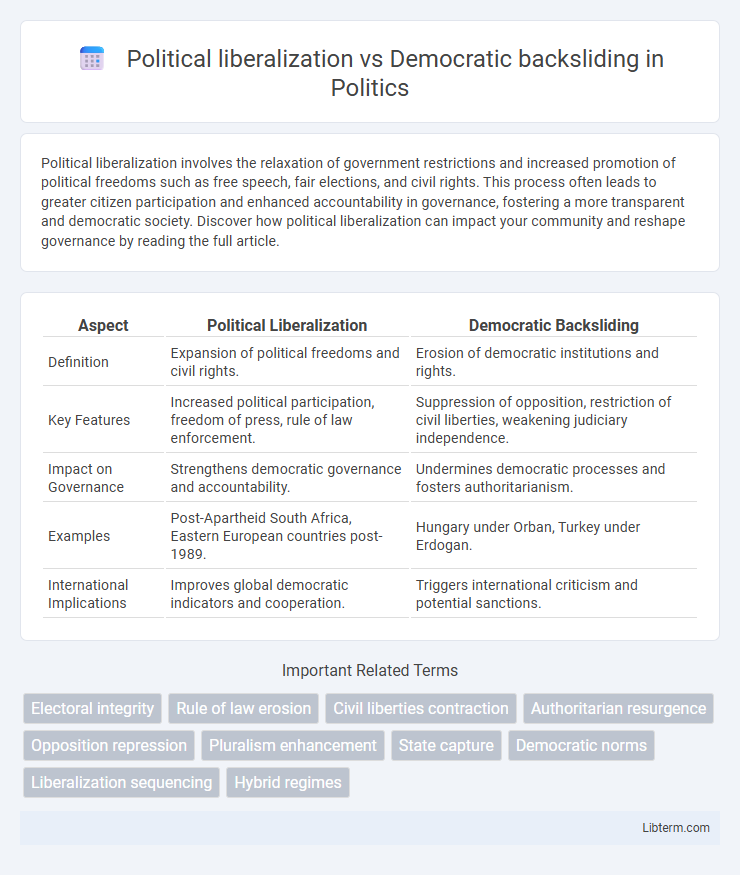Political liberalization involves the relaxation of government restrictions and increased promotion of political freedoms such as free speech, fair elections, and civil rights. This process often leads to greater citizen participation and enhanced accountability in governance, fostering a more transparent and democratic society. Discover how political liberalization can impact your community and reshape governance by reading the full article.
Table of Comparison
| Aspect | Political Liberalization | Democratic Backsliding |
|---|---|---|
| Definition | Expansion of political freedoms and civil rights. | Erosion of democratic institutions and rights. |
| Key Features | Increased political participation, freedom of press, rule of law enforcement. | Suppression of opposition, restriction of civil liberties, weakening judiciary independence. |
| Impact on Governance | Strengthens democratic governance and accountability. | Undermines democratic processes and fosters authoritarianism. |
| Examples | Post-Apartheid South Africa, Eastern European countries post-1989. | Hungary under Orban, Turkey under Erdogan. |
| International Implications | Improves global democratic indicators and cooperation. | Triggers international criticism and potential sanctions. |
Defining Political Liberalization and Democratic Backsliding
Political liberalization refers to the process of expanding civil liberties, increasing political participation, and reducing authoritarian control, often marked by freer elections and enhanced rule of law. Democratic backsliding involves the erosion of democratic institutions, weakening of checks and balances, and curtailment of political freedoms, leading to increased authoritarianism. Understanding these concepts is crucial for analyzing shifts in governance and the stability of democratic systems worldwide.
Historical Evolution of Political Liberalization
The historical evolution of political liberalization traces the gradual expansion of civil liberties, rule of law, and political pluralism since the Enlightenment era, with significant milestones including the gradual dismantling of authoritarian regimes in 19th-century Europe and the post-World War II democratization wave. Key examples of political liberalization can be observed in the transition of Spain after Franco's dictatorship and the Eastern Bloc's collapse in the late 20th century. These periods highlight the complex interplay between expanded political freedoms and the ongoing risks of democratic backsliding due to institutional weaknesses or populist pressures.
Key Drivers of Democratic Backsliding
Democratic backsliding is driven by factors such as weakening rule of law, erosion of institutional checks and balances, and the rise of authoritarian populism that undermines democratic norms. Economic instability and social polarization exacerbate vulnerabilities, enabling autocratic leaders to consolidate power by restricting civil liberties and manipulating electoral processes. The decline in media freedom and increased executive dominance further accelerate the retreat from political liberalization, threatening democratic governance worldwide.
Comparative Analysis: Liberalization vs. Backsliding
Political liberalization involves expanding civil liberties, enhancing electoral integrity, and promoting political pluralism, contributing to democratization. Democratic backsliding is characterized by the erosion of these freedoms, weakening checks and balances, and increasing authoritarian governance despite maintaining formal democratic institutions. Comparative analysis highlights that liberalization fosters institutional trust and active citizen participation, whereas backsliding often leads to diminished accountability and restricted political competition.
Case Studies: Successes and Failures
Political liberalization fosters expanded civil liberties and political participation, as evidenced by South Korea's transition from authoritarianism to a robust democracy. Conversely, democratic backsliding in Hungary showcases how elected leaders can undermine democratic institutions, restrict media freedom, and consolidate power. These contrasting outcomes highlight the importance of strong institutions, active civil society, and independent judiciary in sustaining democratic gains or preventing authoritarian regression.
The Role of Civil Society and Media
Civil society and media play crucial roles in political liberalization by enhancing transparency, fostering public participation, and holding governments accountable. During democratic backsliding, these institutions often face repression, censorship, or co-optation, weakening their ability to challenge authoritarian practices. Robust civil society networks and independent media act as safeguards, promoting democratic norms and countering attempts to erode political freedoms.
Impact on Governance and Human Rights
Political liberalization expands civil liberties, political freedoms, and institutional transparency, enhancing governance effectiveness and human rights protections by fostering accountability and citizen participation. Democratic backsliding erodes these gains through weakened checks and balances, curtailed press freedom, and suppressed opposition, leading to authoritarian tendencies and increased human rights violations. The contrast between these processes determines the stability of democratic institutions and the resilience of human rights frameworks within a country.
International Responses and Influence
International responses to political liberalization often involve diplomatic support, economic aid, and promotion of democratic norms through multilateral organizations such as the United Nations and the European Union. In contrast, democratic backsliding prompts targeted sanctions, withdrawal of financial assistance, and increased scrutiny from entities like the US State Department and Freedom House, which monitor governance and human rights abuses. Global influence campaigns leverage soft power to encourage reforms or deter authoritarian tendencies, shaping domestic political landscapes through international pressure and cooperation.
Early Warning Signs and Indicators
Political liberalization is often marked by increased press freedom, broader civic engagement, and legal reforms enhancing political participation, while democratic backsliding exhibits rising authoritarian behavior, erosion of judicial independence, and restrictions on media and opposition parties. Early warning signs of backsliding include weakening of checks and balances, suppression of dissenting voices, and manipulation of electoral processes. Indicators such as declining civil liberties indices, reduced transparency, and increasing executive overreach serve as critical metrics for distinguishing between genuine liberalization and emerging authoritarian tendencies.
Future Prospects for Democracy and Liberalization
Political liberalization often signals the expansion of civil liberties, rule of law, and participatory governance, laying a foundation for strengthened democratic institutions. Democratic backsliding, characterized by erosion of electoral integrity and weakening of checks and balances, threatens these gains by consolidating authoritarian tendencies. Future prospects for democracy hinge on the resilience of institutional frameworks, vigilance by civil society, and adaptive reforms that balance liberal values with socio-political stability.
Political liberalization Infographic

 libterm.com
libterm.com